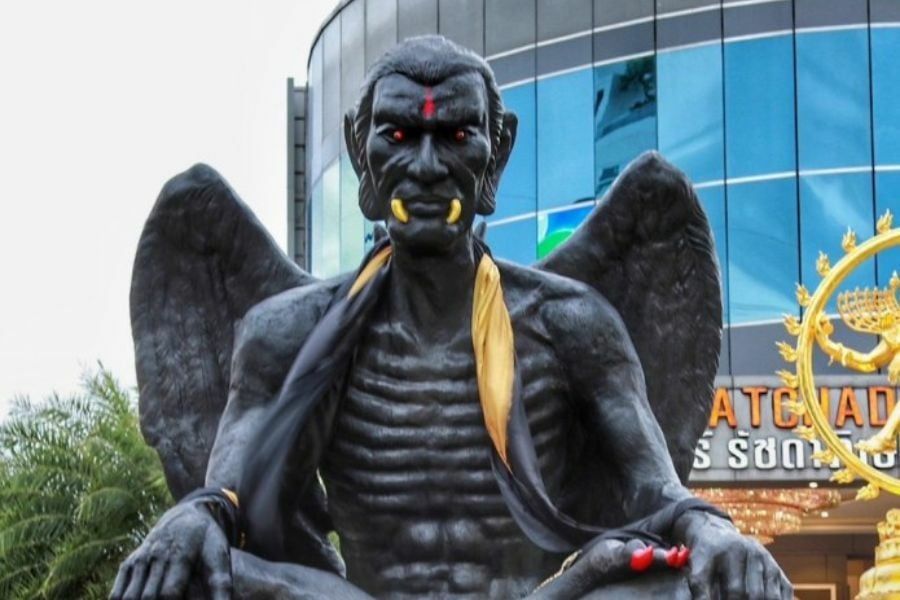Kru Kai Kaew believers reportedly sacrifice puppies and kittens to the diety

Thai believers in the supernatural power of the Kru Kai Kaew deity rocked social media this week after they reportedly sought puppies and kittens for a sacrificial ceremony in the pursuit of luck and prosperity. The practice has taken a dark turn as some followers hope to receive lucky lottery numbers in exchange for innocent lives.
Kru Kai Kaew, portrayed as an anthropomorphic entity adorned with resplendent wings and gleaming golden talons, recently gained even more notoriety when a colossal sculpture of the deity caused a major traffic jam on Bangkok’s Rachadapisek Road. The statue’s towering height hindered its passage through an underpass, sparking rumours that this was a calculated move to seize public attention.
The deity’s ascent to social media stardom led to the establishment of dedicated Facebook groups, where enthusiasts exchanged anecdotes, rituals, and experiences related to their devotion to Kru Kai Kaew. These digital communities buzzed with activity, thriving on the shared reverence for the entity.
However, the atmosphere darkened when a cult member posted on one of these groups, soliciting puppies and kittens for a sacrificial rite to appease Kru Kai Kaew. This ritualistic act was intended to secure favour in return – the bestowing of lucky lottery numbers.
Shockingly, some suggestions within these groups urged participants to multiply their sacrificial offerings in the quest for enhanced success. Disturbingly, one post even advised performing the sacrifice while the animal was still alive, right in front of the deity’s statue, to make their wishes come true.
The controversy spurred cult members to defend their faith, asserting that such practices were a smear campaign devised to tarnish Kru Kai Kaew’s image. Animal advocates, alarmed by the revelations, prompted the Watchdog Thailand Foundation to probe the matter. Yet, much of the online engagement seemed to originate from unidentifiable and counterfeit accounts.
Thai netizens took to the virtual sphere to share their thoughts on the deity, debating the propriety of praying to an entity with an uncertain origin. Some argued that Kru Kai Kaew’s appearance was not one of respect but rather of fear, resembling a malevolent entity rather than a benevolent deity.
The origins of Kru Kai Kaew remain shrouded in ambiguity. A report on Amarin TV traced its beginnings to a Thai monk’s meditation journey in Cambodia’s Angkor Wat, where he claimed to have encountered Kru Kai Kaew’s soul. Crafting a statue to depict this soul, the monk passed it on to another Thai individual, Suchart Rattnasuk. Suchart, inspired by his imagination, gave form to the deity, a form that has been passed down through generations.
Despite these narratives, historians remain sceptical about the deity’s historical ties, questioning its role as a potential mentor to the Khmer Empire’s King Jayavarman VII. Scrutiny of historical records yielded no mention of Kru Kai Kaew within the annals of the Khmer Empire, leaving its past enshrouded in uncertainty.
Latest Thailand News
Follow The Thaiger on Google News:


























